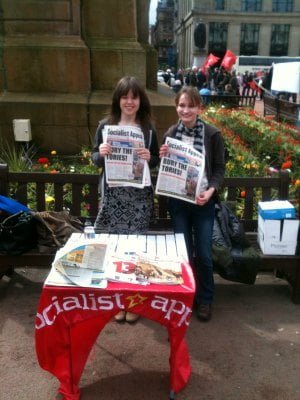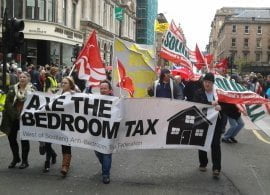Saturday 4th May saw thousands march in the annual Glasgow May Day demonstration. A proud tradition in the home of ‘Red Clydeside’, the demonstration brings activists together in celebration of International Workers’ Day. Rachel Gibbs and Michael Allan of the Glasgow Marxists report on the recent Glasgow May Day 2013 celebrations.
Saturday 4th May saw thousands march in the annual Glasgow May Day demonstration. A proud tradition in the home of ‘Red Clydeside’, the demonstration brings activists together in celebration of International Workers’ Day. Videos shown at the rally in the O2 Academy illustrated how through the years the demonstrations have charted the mood of the working class, with images from the 1930s showing support for the International Brigades and the film from the 1980s and 1990s featuring banners in support of the miners and resistance to the Poll Tax. This year, anti-Bedroom Tax banners and slogans were most prominent showing the impact of the new austerity measures being planned by the Coalition.
The Bedroom Tax is just one of many government policies that will impact workers already facing high levels of unemployment, under-employment, and pay freezes and cuts – all whilst the wealthiest in society receive a tax cut. The demonstration highlighted that there is a willingness to fight these measures; all that is required is organisation and direction – something that could be provided by trade unions, especially with the possibility for the unemployed and casual workers to join Unite Community, and the possibility of a much talked about 24 hour general strike. Such action would show the strength of the working class and could be the start of a fight back against austerity.
 Naturally, the political question of the moment in Scotland – the independence referendum – also featured at the demonstration, though it must be said that pro-independence groups were not as visible as they had been on previous demonstrations. Perhaps it is an indication that the May Day rally was attended by more than just the “usual crowd”, demonstrating the wider pull of the labour movement. The need for workers’ unity across borders in defeating austerity measures can be seen in the history of the issues highlighted at May Day – such as the Spanish Civil War and the Poll Tax – and such unity will also be required if the bedroom tax is to be defeated.
Naturally, the political question of the moment in Scotland – the independence referendum – also featured at the demonstration, though it must be said that pro-independence groups were not as visible as they had been on previous demonstrations. Perhaps it is an indication that the May Day rally was attended by more than just the “usual crowd”, demonstrating the wider pull of the labour movement. The need for workers’ unity across borders in defeating austerity measures can be seen in the history of the issues highlighted at May Day – such as the Spanish Civil War and the Poll Tax – and such unity will also be required if the bedroom tax is to be defeated.
International Workers’ Day must be understood to be truly international in the connections between workers who are all oppressed by the capitalist system, which can only be defeated through revolutionary movements on a global scale. Glasgow May Day showed that there are many here who are willing to fight the austerity measures, which are a direct result of capitalism, whilst its history must be considered as a lesson in the importance of a united British working class fighting against the oppression that crosses all borders.






